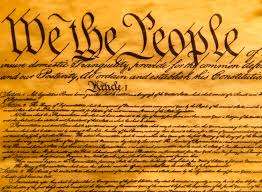The Volokh Conspiracy
Mostly law professors | Sometimes contrarian | Often libertarian | Always independent
Public ignorance about the Constitution

A new survey conducted by the University of Pennsylvania's Annenberg Public Policy Center finds that most Americans are ignorant of many very basic facts about the Constitution. Chris Cilizza of CNN summarizes some of the lowlights:
* More than one in three people (37%) could not name a single right protected by the First Amendment. THE FIRST AMENDMENT.
* Only one in four (26%) can name all three branches of the government….
* One in three (33%) can't name any branch of government. None. Not even one.
A closer look at the First Amendment question reveals that 48% recalled that the Amendment protects the right to freedom of speech. The other rights protected by the Amendment (freedom of religion, freedom of the press, the right to petition the government, and freedom of assembly) are far less well-known. For example, only 15% remembered the right to freedom of religion.
These survey results do not come as a surprise to experts on political knowledge. They are largely consistent with previous data going back several decades, showing widespread ignorance on a wide range of legal and political matters, including the Constitution. As Cilliza points out, the Annenberg results paint an even bleaker picture than earlier polls. For example, surveys typically find that some 35-40% of Americans can name the three branches of government. The Annenberg figure of 26% is unusually low. But even if it is an aberration, the results from previous surveys are nothing to write home about.
The protection of constitutional rights is in large part the business of lawyers, judges, government officials, and other experts. But public opinion plays an important role, as well, which it is unlikely to do as effectively if most of the public is ignorant. As Kathleen Hall Jamieson, Director of the Annenberg Center, puts it, "[p]rotecting the rights guaranteed by the Constitution presupposes that we know what they are. The fact that many don't is worrisome."
Voter-knowledge optimists might point out that the Annenberg survey understates the true level of public knowledge, because it relies on open-ended questions, where the respondent has to recall the answer on his or her own, without any clues beyond those given by the question itself. Some studies find that the public does better on multiple choice surveys. The latter can help jog your memory. But, as I explain more fully in my book on political ignorance, most of the public scores poorly on political knowledge even in multiple choice surveys. And, if open-ended questions understate knowledge, multiple choice questions tend to overestimate it, because many respondents get the "right" answer by guessing, without actually knowing.
Recent events, such as Donald Trump's effective exploitation of public ignorance, have led many to start taking the problem more seriously. But, in truth, the problem long predates Trump, and more conventional politicians - including President Obama - have also found ways to manipulate it to their advantage.
The problem is a very difficult one to address, in part because it is mostly the result of rational behavior by voters, not stupidity or unavailability of information. If your only reason to become informed about politics or the Constitution is to make better choices at the ballot box, that turns out not to be much of an incentive at all. The odds that your vote will decide the outcome are infinitesimally small. Similarly, it is unlikely that any one ordinary citizen's knowledge of the Constitution will make a significant difference to the enforcement of constitutional limits on government power. But, while any one voter's ignorance usually matters very little, systematic ignorance by the majority can cause great harm.
There is no easy solution to the problem. In my work, I have advocated reducing the risks of political ignorance by limiting and decentralizing government power. Others have proposed a variety of different approaches, such as targeted civic education initiatives, "sortition," and just simply paying voters to become better informed.
It may be that we will need to try variety of different strategies to maximize the chance of success. In the meantime, there is much that individual citizens can do to become better-informed voters - including learning more about the Constitution. But I fear all too few will actually do it.
NOTE: In the original version of this post, I accidentally cut freedom of the press from the list of rights protected by the first Amendment. I intended to put it in a different place in the list, but instead forgot to "paste" it there after cutting it from its original location. I apologize for the mistake, which I have now corrected.


Show Comments (0)